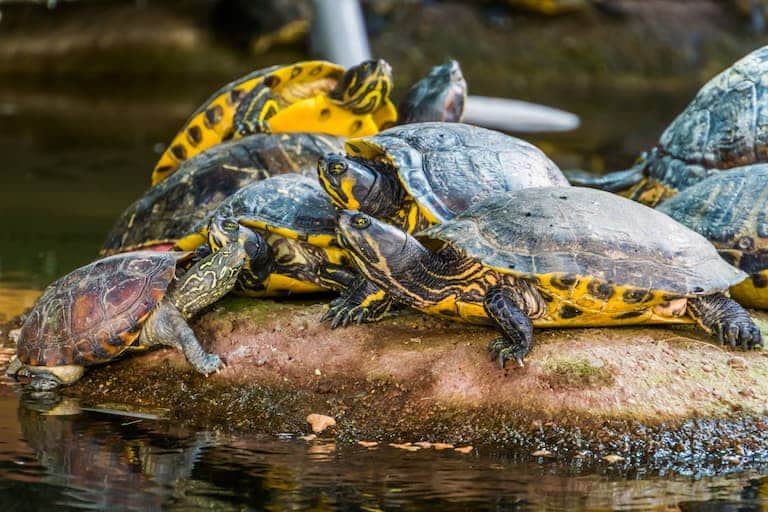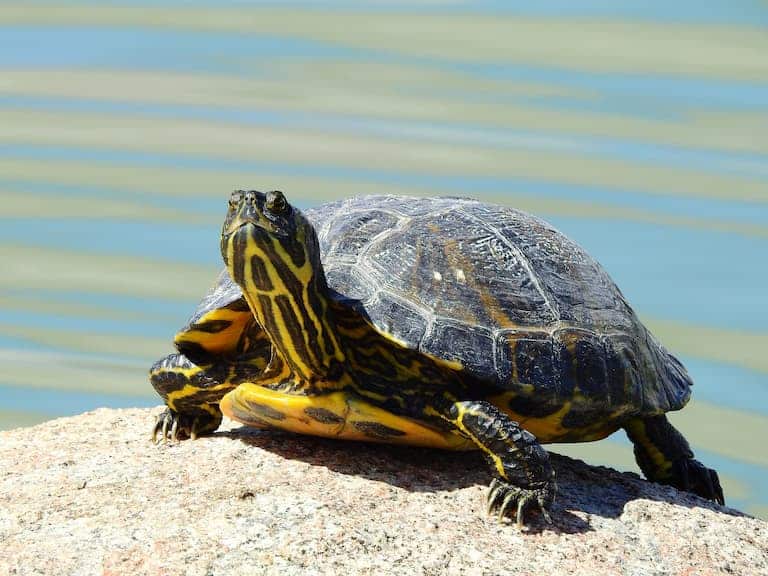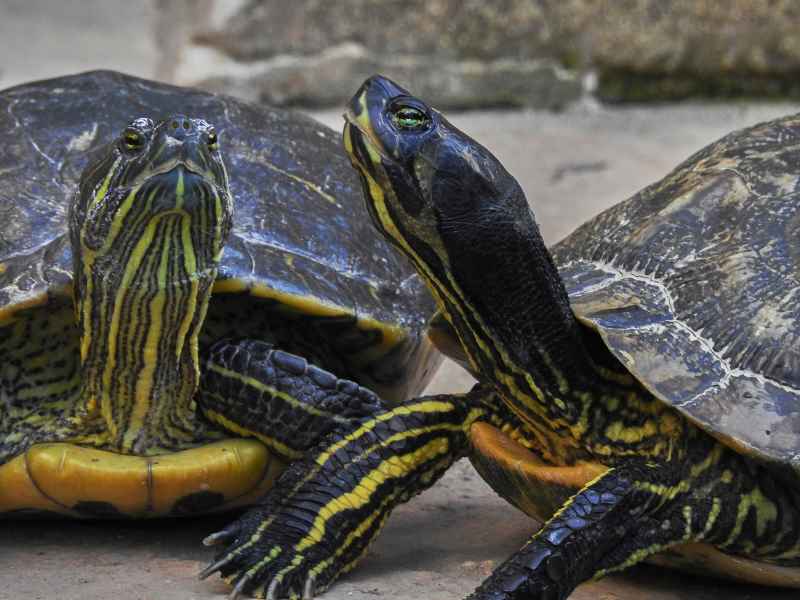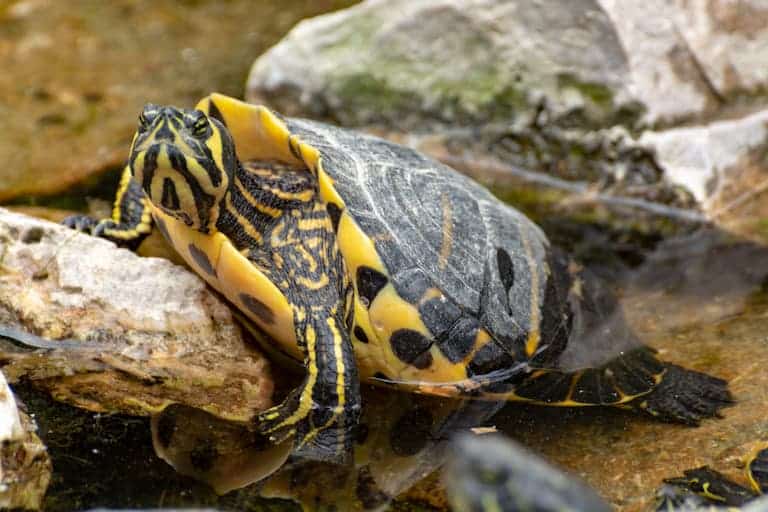Why Are Your Yellow-Bellied Slider’s Eyes Closed?
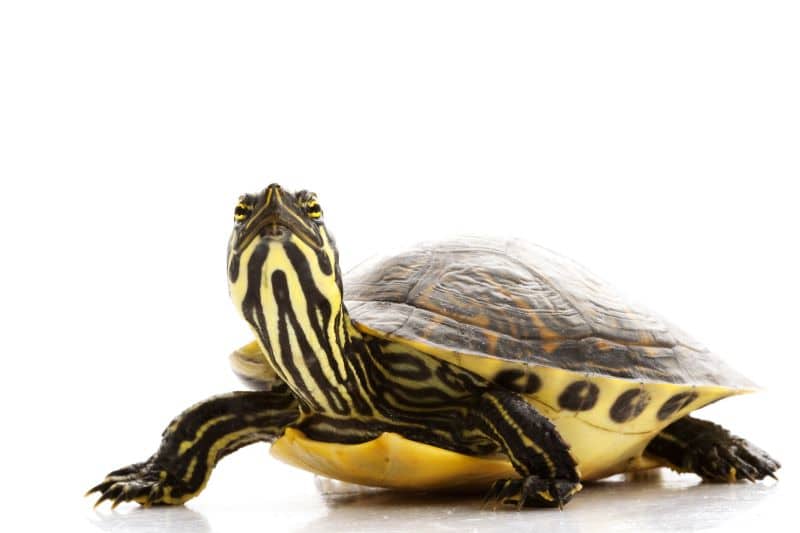
Looking after a turtle is a joy, but it can be pretty worrying when you notice behavior that is out of the ordinary. If your yellow-bellied slider’s eyes are closed for long periods of time, you will want to know why!
Yellow-bellied sliders will often rest with their eyes closed, especially when they are basking. Their eyes will also be closed when they are sleeping. If your yellow belly’s eyes are closed while it is awake and moving around, however, then there may be cause for concern. They may have a vitamin deficiency or be struggling with an infection or injury, particularly if you notice swelling.
This article will tell you everything you need to know about why your yellow-bellied slider might have its eyes closed so that you can be sure you are doing everything that you can to keep your turtle healthy and happy.
Contents
What Does it Mean When a Turtle’s Eyes Are Closed?
All turtles spend a lot of time with their eyes closed naturally, so you don’t necessarily need to worry straight away. Yellow-bellied sliders love to bask in the warmth, and they will often rest in an almost sleep-like state, with their eyes closed for much of the day.
Of course, when your turtle is sleeping, it will also have its eyes closed and this is nothing to worry about. Where there may be a problem, however, is if your turtle is unable to open its eyes, even when it is awake and active.
Why Isn’t My Yellow-Bellied Slider Turtle Opening His Eyes?
If your yellow-bellied slider is not able to open its eyes, or seems to be struggling to do so, then there may be something wrong. They may be lethargic and overly tired, or they may have an eye problem. Many pet turtles suffer from all sorts of eye problems which may make it difficult for them to open their eyes. You might notice:
- Cloudiness in one or both eyes
- Excess discharge from the eye area
- Swollen eyelids
Any of these symptoms are indicative that your turtle is suffering from an illness or a vitamin deficiency that is causing problems for its eyes.
Should I Be Worried?
If your turtle is overly sleepy and seems to lack energy, then there may be an issue in their environment that needs resolving. Make sure that your yellow belly is getting the right amount of warmth and food, and that its water is nice and clean.
If you are noticing any discharge, cloudiness, or swelling, then your turtle might be dealing with an infection, illness, or vitamin deficiency. Environmental issues, such as dirty water or inadequate humidity, are common causes of eye infections. Turtles can also injure their eyes on rocks or decorations, and their eyes can dry out if they are too close to heat lamps for too long.
Vitamin A deficiency is also likely to result in eye infections. Without enough of this vitamin in their diet, the tissues around your turtle’s eye can become weak and vulnerable to infection and swelling.
Can I Do Anything Myself or Do I Need a Vet?
First and foremost, make sure that your yellow-bellied slider is in a healthy environment and is getting the right diet. This is important whether or not you are going to take them to the vet. Make sure that they have clean water and bedding, and that they are eating properly.
If your turtle is struggling to keep their eyes open, or you are noticing signs of an infection, then you should take them to the vet. They may need to have a powder or injection to increase their vitamin A levels, or they may need to have a minor surgery if they have an abscess that needs treatment.
Final Thoughts: Yellow-Bellied Slider’s Eyes Closed
The vast majority of the time, a yellow-bellied slider will have its eyes closed because it is happy and resting. However, if they are unable to open their eyes, or you notice any cloudiness, discharge, or swelling, then they may be suffering from eye problems.
Eye problems are common in pet turtles and are usually the result of an inadequate environment or a vitamin deficiency leading to illness, injury, or infection. To avoid eye problems, make sure that your yellow-bellied slider is living in a suitable habitat and is getting a healthy diet. You should contact your vet if you notice any signs of infection or illness.
